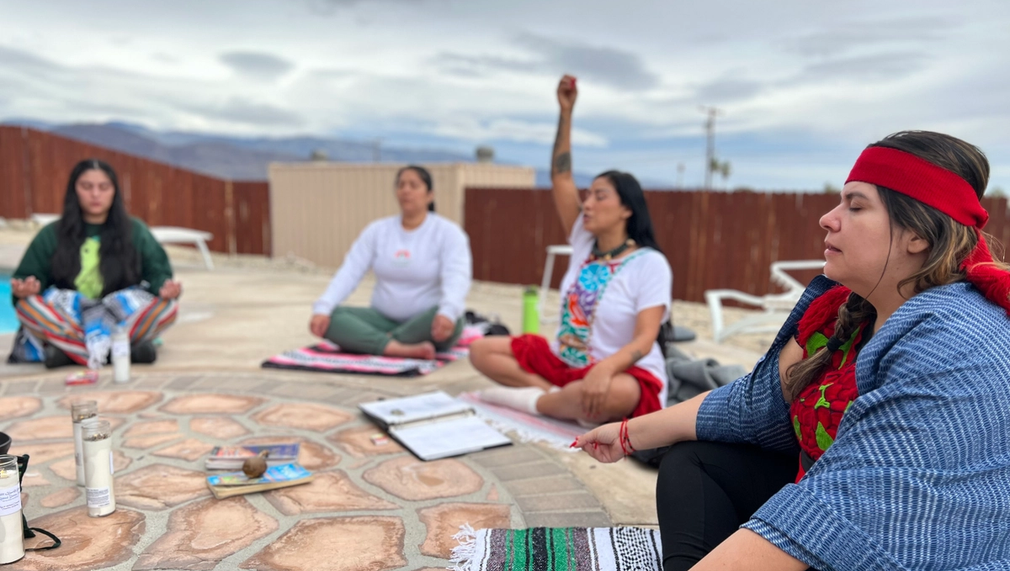Sanando Semillas: Cultivating Healing Justice Youth Leaders
KLBRI seeks to disrupt the abuse to prison pipeline and develop a pipeline of emerging healing justice youth leaders committed to individual and collective healing, systems change and liberation. With funding from LA2050, KLBRI hopes to launch Xinachtli Youth Leadership Rites of Passage Circulos and teen Mental Health First Aid to ensure that systems-impacted girls and gender expansive youth of color can heal and thrive.

What is the primary issue area that your application will impact?
Support for Foster and Systems-Impacted Youth
In which areas of Los Angeles will you be directly working?
Central LA
East LA
San Gabriel Valley
City of Los Angeles
In what stage of innovation is this project, program, or initiative?
Expand existing project, program, or initiative
What is your understanding of the issue that you are seeking to address?
In 2022, the CDC released a Youth Risk Behavior Survey identified Latinx and Indigenous youth to be amongst the highest rated to have experienced sexual violence. Sexual abuse is a primary predictor of girls' entry into the juvenile justice system. A 2015 study about girls in the juvenile justice system indicated that in California, nearly 81% of girls were sexually or physically abused. Sexual violence increases the likelihood of suicidal ideation, depression, substance use, and PTSD in survivors. Additionally, Indigenous and Latinx youth have the highest rates of mental health challenges, including suicidality. About half of mental health challenges begin by age 14. When untreated, mental health disorders likely worsen, persist into adulthood, and contribute to secondary challenges like substance use, contact with law enforcement, school dropouts, job loss, and even death. It is imperative that prevention and early intervention programs exist to mitigate high risk issues for youth.
Describe the project, program, or initiative this grant will support to address the issue.
KLBRI's project consists of implementation of the Xinachtli Youth Rites of Passage curriculum weaved with the teen Mental Health First Aid (tMHFA) training program. Xinachtli is a 16-week gender-responsive, culturally-based rites of passage philosophy, process, and curriculum that promotes healing, resilience, and leadership capacity of Xicana, Latinx and Indigenous girls and gender expansive youth. tMHFA teaches and trains teens in grades 10-12 (ages 15-18) how to identify, understand and respond to signs of a mental health or substance use challenge in their friends and peers. Both Xinachtli and tMHFA are most effective as prevention and early intervention programs. The earlier intervention, the better the outcome. KLBRI understands that the health of the circle is determined by the health of the facilitators as such KLBRI hopes to access funds from this project to build facilitator capacity to work with youth. One of our facilitator cohort participants shared "Relationships, families, and communities grounded in radical love and reciprocity are possible through the existence of KLBRI X Xinachtli. This circulo (circle) cultivates a space of care that deepens the relationships of self, each other, and our connections. If more girls, women, and gender-expansive folx had the opportunity of walking with KLBRI X Xinachtli, more windows of healing and resilience could open for our communities to build and thrive." We are ready to answer that call.
Describe how Los Angeles County will be different if your work is successful.
Los Angeles County would be transformed by our innovative and healing-centered program that weaves Xinachtli Rites of Passage Youth Leadership with the teen Mental Health First Aid curricula in multiple ways. Firstly, systems impacted femme-identified and gender expansive youth will have safe and sacred spaces and a cosmovision for healing and leadership development grounded in indigenous pathways of healing. Secondly, this would increase youth's sense of belonging, identity formation, and interconnectedness while catalyzing intergenerational organizing power. These outcomes reflect to both youth and communities the power of la cultura cura (culture heals) framework to disrupt the abuse to prison pipeline, reduce recidivism, and increase positive health outcomes for youth, their families, and communities. Lastly, participants would serve as peer mental health first aiders implementing prevention and stigma-reduction strategies for peers around substance use and community violence.
What evidence do you have that this project, program, or initiative is or will be successful, and how will you define and measure success?
KLBRI's project outcomes and effectiveness is evident in both curriculums being evidence based and community defined. Pre and post surveys for each respective program will measure changes in behaviors, attitudes, and feelings using the indicators of emotional connection, cultural identity, increased knowledge of mental health, interconnectedness, and self-efficacy as well as decreased risk factors such as substance use, school absenteeism, low academic performance, and justice involvement. We measure the success of the program by the ability for participants to integrate the teachings in their daily life and feel more equipped to face and cope with daily challenges, feel empowered to continue engaging as teen mental health first aiders, and engaged in healing and community change work. We hope that our work can expand the use of effective community responses, including options that disrupt the abuse to prison pipeline and keep youth away from the justice system altogether.
Approximately how many people will be impacted by this project, program, or initiative?
Direct Impact: 45
Indirect Impact: 2,250
Describe the role of collaborating organizations on this project.
KLBRI is fiscally sponsored through the Los Angeles Indigenous Peoples Alliance (LAIPA). We directly benefit from the mentorship and guidance of LAIPA members like Director and Xinachtli Rites of Passage Curriculum Author, Sara Haskie-Mendoza. Her expertise in the topic is essential in anchoring our work with integrity towards the mission. LAIPA's team also includes well respected Elders and social justice leaders that offer ancestral wisdom passed down through oral teachings around ancestral cosmovisions. KLBRI will also partner with Xinachtli Comadre National Colectiva to create an intergenerational Working Group to support as an elder/maestra council for the program and lean on their collective wisdom to mentor youth and facilitators.